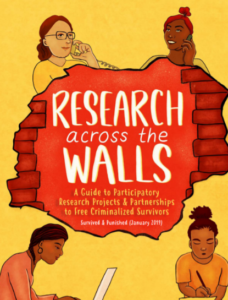Research Across the Walls is a new resource available from Survived and Punished, a national coalition working to support incarcerated survivors. Survived and Punished advocates for an end to policies and practices that criminalize and punish survivors for  actions taken to survive sexual and domestic violence. Research Across the Walls presents tools, resources, ideas, models, and inspiration for scholars and advocates to pursue community-based research projects.
actions taken to survive sexual and domestic violence. Research Across the Walls presents tools, resources, ideas, models, and inspiration for scholars and advocates to pursue community-based research projects.
Summary of currently available research
According to the guide, “for many survivors, experiences of policing, criminalization, and incarceration are deeply intertwined with gender-based violence. Yet very little research exists about criminalization of survivors.” The summary of research findings demonstrates the prevalence of sexual and domestic violence experienced by women in prison, and at the same time illustrates the need for more research to understand these experiences and their impact.
- 75% of the women incarcerated at the Bedford Hill Maximum Security Correctional Facility in New York reported that they had experienced physical intimate partner violence as an adult (Browne, Miller and Maguin, 1999).
- A 2010 study of women in a California county jail found that 84% of the women had experienced physical violence by a partner (Kelly, 2010).
- A study published in 2014 found that 84% of girls in juvenile detention had an experience of family violence, 41% had experienced physical abuse, and 31% had experienced sexual abuse (Baglivio, et al., 2014, as cited in Sherman and Balck, 2015).
- One study in California found that 93% of women incarcerated for homicide of an intimate partner were abused by the person they killed; 67% women indicated the homicide resulted from an attempt to protect themselves or their children (Law 2014).
- A study in New York State found that, of women who had killed someone close to them, 67% had been abused by the homicide victim (NY State Department of Correctional Services, 2007).
- In 2000, a study of domestic-violence survivors under New York State’s mandatory arrest policies found that survivors of domestic violence were arrested in 27 percent of cases reported through a domestic violence hotline. Eighty-five percent of survivors who were arrested had a prior documented record of being subjected to domestic violence, and 85% were injured during the incident that led to their arrest. A significant majority (66%) who were arrested along with their abusers (dual arrest) or arrested as a result of a complaint lodged by their abuser (retaliatory arrest) were Black or Latinx. Forty-three percent were living below the poverty line, and 19% were receiving public assistance at the time (Haviland et al., 2001).
- Respondents to a 2015 survey (Goldscheid, et al., 2015) of more than nine hundred anti-violence advocates, survivors, and other stakeholders from almost all fifty states found that police were sometimes or often demeaning or disrespectful to survivors, did not believe them, or did not take domestic violence or sexual assault seriously. Almost a third of respondents said that police sometimes or often used inappropriate force against survivors. They also reported that officers threatened to arrest survivors, particularly if they were called multiple times. More than half of survey respondents reported anti-immigrant, anti-Muslim, and anti-LGBTQ perceptions among police officers.
Resources for new research
The guide presents practical tips on how and where to find public information about criminalization, arrest, prosecution, and incarceration. One potential new source of data is the Police Data Initiative, which publishes open data sets made available by 130 participating law enforcement agencies. Six local police agencies in Washington participate in the project: Auburn, Bremerton, Kelso, Seattle, Spokane, and Tacoma.
Research Across the Walls includes a guide to supporting incarcerated and formerly incarcerated survivors and developing collaborative relationships with survivors and advocates. An introduction to Participatory Action Research walks through principles of conducting research projects in which the people directly affected by the issue being studied are involved in defining the problems, asking the questions, and proposing solutions.
Learn more
Victim Defendant Project (from King County’s Coalition Ending Gender-Based Violence)